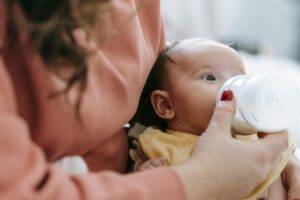Welcoming a newborn into the family is an exciting yet sometimes confusing time for new parents. One of the many questions that often arise is, “Are newborn baby hiccups normal?” This comprehensive guide will explore the nature of newborn baby hiccups, why they occur, and what can be done to help alleviate them.
We will provide expert answers and practical solutions to ensure you feel confident and prepared to care for your little one.
Understanding Newborn Baby Hiccups
Newborn baby hiccups are involuntary contractions of the diaphragm followed by the quick closure of the vocal cords, which produce the characteristic “hic” sound. These contractions are usually harmless and quite common in infants.
Why Do Newborns Get Hiccups?

Newborns can get hiccups for several reasons, many of which are completely normal:
- Immature Diaphragm: A newborn’s diaphragm is still developing and can be easily stimulated.
- Feeding: Overfeeding, eating too quickly, or swallowing too much air can trigger hiccups.
- Temperature Changes: Sudden changes in stomach temperature, such as drinking cold milk, can cause hiccups.
- Gastroesophageal Reflux (GER): Some babies experience reflux, where stomach contents come back up into the esophagus, causing hiccups.
Are Newborn Baby Hiccups Normal?
Frequency and Duration of Hiccups
Hiccups in newborns are generally common and usually nothing to worry about. They occur multiple times and often last a few minutes to an hour. For most babies, hiccups don’t cause any discomfort.
Practical Solutions to Reduce Newborn Baby Hiccups
1. Feeding Adjustments
Adjusting your baby’s feeding routine significantly reduces the occurrence of hiccups. Here are some tips:
- Slow Feeding: Feed your baby slowly to prevent swallowing too much air.
- Frequent Burping: Incorporate frequent burping sessions during and after feeding to expel trapped air. This prevents the buildup of gas in the stomach which causes hiccups.
- Smaller, Frequent Feedings: Offering smaller amounts of milk more frequently prevents your baby from swallowing too much air.
- Timing of Feedings: Feed your baby before they get too hungry to prevent them from gulping milk too quickly.
- Correct Latch: Ensure your baby has a proper latch if breastfeeding, which minimizes air intake.
- Proper Bottle Position: When bottle-feeding, hold the bottle at an angle that allows the milk to fill the nipple, reducing the air your baby swallows. Also, anti-colic bottles reduce the amount of air swallowed during feedings.
2. Effective Burping Techniques
- Over-the-Shoulder Burp: Hold your baby upright with their head resting against your shoulder. Gently pat or rub their back until they burp. This position uses gravity to help release trapped air.
- Sitting Up Burp: Sit your baby on your lap, supporting their head and chest with one hand, while gently patting their back with the other hand.
- Face-Down Burp: Lay your baby face-down across your lap on their stomach and gently pat or rub their back.
3. Avoiding Overstimulation
Babies get hiccups when they’re overstimulated. Create a calm feeding environment. Avoid overstimulation and reduce distractions and noise to help your baby feed slowly and comfortably. Loud noises, bright lights, and excessive handling make a baby anxious or overly excited.
4. Creating a Routine
Establishing and maintaining a feeding and burping routine helps minimize hiccups. Ensure your baby is calm and not overly hungry before feeding. This routine includes feeding your baby in a quiet, comfortable environment, burping them midway through and after feedings, and holding them upright for a while post-feeding.
Hold your baby upright for 20-30 minutes after feeding This helps prevent the stomach contents from pressing against the diaphragm, which can trigger hiccups.
5. Temperature Control
Sudden temperature changes can cause hiccups. Ensure your baby is kept at a stable, consistent, and comfortable temperature in your home. Avoid feeding your baby cold milk if it seems to trigger hiccups. Avoid sudden temperature changes, such as moving from a warm to a cooler room,
6. Using a Pacifier
Pacifiers are very effective in soothing hiccups. The sucking motion helps relax the diaphragm and stop the hiccups. Ensure the pacifier is clean and appropriately sized for your baby. This method is useful if your baby seems uncomfortable due to hiccups.
7. Herbal Remedies
Herbal remedies like gripe water settle the baby’s stomach and provide relief from hiccups. Gripe water typically contains a mixture of herbs such as ginger and fennel, believed to help with digestion and reduce gas. Always consult with your pediatrician before giving any herbal remedy to your baby.
When to Seek Medical Intervention
While hiccups are usually normal, there are a few instances where you might need to consult a pediatrician:
Persistent Symptoms
Your baby’s hiccups persist and seem to cause discomfort. While hiccups are typically benign, certain signs may indicate a more serious issue:
- Frequent or Prolonged Hiccups: If your baby experiences hiccups that last for several hours or occur multiple times a day for an extended period, it may be worth consulting a pediatrician.
- Associated Symptoms: If hiccups are accompanied by other symptoms such as frequent vomiting, irritability, excessive fussiness, or difficulty feeding, it could signal an underlying condition such as gastroesophageal reflux disease (GERD).
- Poor Weight Gain: If your baby is not gaining weight appropriately, persistent hiccups with other symptoms might indicate a need for medical evaluation.
Regular Check-ups with Your Pediatrician
Regular pediatric check-ups are essential to ensure your baby’s overall health and development. Your pediatrician can determine whether to consider GERD or another underlying issue that needs to be addressed.
Understanding the Connection Between Hiccups and Reflux
What is GERD?
Gastroesophageal reflux disease (GERD) is when stomach contents flow back into the esophagus, causing discomfort and sometimes hiccups. While occasional reflux is normal, GERD is more severe and requires medical attention.
Symptoms in Newborns
Signs that your baby might have GERD include frequent vomiting, irritability during or after feedings, arching of the back, and poor weight gain. If you suspect your baby has GERD, consult your pediatrician for an appropriate diagnosis and treatment plan.
Management
Management of GERD typically involves feeding modifications, such as smaller, more frequent meals, and keeping your baby upright after feedings. In some cases, medication may be necessary to reduce stomach acid and alleviate symptoms.
Expert Insights on Newborn Baby Hiccups
1. Pediatrician Recommendations
Many pediatricians, including those at Omega Pediatrics, support the view that hiccups are a normal part of infancy and typically harmless. According to Dr. Sarah Johnson, a pediatrician at Omega Pediatrics, “Hiccups are a natural reflex in babies They’re rarely a sign of anything serious and usually resolves on their own.
Hiccups are usually not a cause for concern. However, seek medical advice if hiccups are persistent or accompanied by other symptoms.”
2. Scientific Research
Hiccups are believed to be a vestigial reflex, a leftover from an earlier stage of human evolution. They indicate that your baby’s nervous system is maturing and developing.
Scientific studies have shown that hiccups in infants are a normal reflex and part of the development of the nervous system. Research indicates that hiccups play a role in preparing the respiratory muscles for breathing and helping to release excess air from the stomach.
3. Evolutionary Perspective
Hiccups may be a vestigial reflex from an earlier stage of human evolution. Some scientists believe that hiccups are a leftover from amphibious ancestors who used a similar reflex to help gulp air and water.
4. The Diaphragm’s Role
The diaphragm, a dome-shaped muscle located just below the lungs, plays a crucial role in breathing. This muscle is still developing and can be easily stimulated, leading to hiccups among newborns.
When the diaphragm contracts suddenly and involuntarily, it causes a quick intake of breath that’s abruptly stopped by the closure of the vocal cords, producing the characteristic hiccup sound. As your baby grows, their diaphragm will mature, and hiccups will likely decrease in frequency.
5. Feeding and Hiccups
Feeding is one of the most common times when newborns experience hiccups. When babies feed too quickly or swallow air while feeding, it leads to hiccups. Monitor your baby’s feeding habits and make adjustments if necessary. For example, the bottle nipple is always filled with milk, not air to reduce the air your baby swallows.
6. Environmental Factors
Sudden changes in temperature, such as moving from a warm room to a cooler one, trigger hiccups in newborns. Keep your baby comfortably warm and avoid drastic temperature changes when possible.
Addressing Parental Concerns
Common Myths about Baby Hiccups
There are several myths and misconceptions about baby hiccups. Separate fact from fiction to avoid unnecessary worry:

- Myth: Hiccups are a sign of a serious medical condition. Fact: In most cases, hiccups are harmless and a normal part of infant development.
- Myth: Hiccups cause discomfort or pain in babies. Fact: Most babies aren’t bothered by hiccups and often continue feeding or sleeping without issue.
- Myth: You need to stop feeding your baby if they hiccup. Fact: Unless the hiccups are causing significant feeding difficulties, it’s usually fine to continue feeding your baby.
True Facts
- Fact: Hiccups are caused by involuntary contractions of the diaphragm.
- Fact: Most babies will experience hiccups, especially in the early months.
- Fact: Hiccups usually don’t cause any discomfort to the baby.
FAQs About Newborn Hiccups
Are Hiccups Painful for Babies?
Hiccups are generally not painful for babies. Most babies don’t seem bothered and will continue to feed or sleep through hiccups without any issues.
Can Hiccups Affect My Baby’s Breathing?
Hiccups do not affect your baby’s breathing. They are a normal reflex and do not interfere with the respiratory system.
How Long Do Baby Hiccups Last?
Baby hiccups can last anywhere from a few minutes to an hour. They usually resolve on their own without any intervention.
Should I Be Worried If My Baby Hiccups Frequently?
Frequent hiccups are usually not a cause for concern. However, if your baby seems distressed, has difficulty feeding, or shows signs of GERD, consult your pediatrician.
Additional Resources for New Parents
- Trusted Websites: For more information on newborn care and managing common concerns, visit reputable websites like the American Academy of Pediatrics or Omega Pediatrics.
- Reading and Learning: Continue educating yourself about newborn care through reliable sources. Books, articles, and trusted websites like Omega Pediatrics can offer a wealth of information to help you navigate the early stages of your baby’s life. By equipping yourself with knowledge and staying attentive to your baby’s needs, you provide the best care possible and cherish the journey of parenthood
- Support Groups: Joining a support group for new parents provides valuable advice and reassurance. Many communities offer in-person and online support groups where you can share experiences and tips.
- Parenting Classes: Consider enrolling in a parenting class to learn more about newborn care, including feeding techniques and how to handle common issues like hiccups. Many hospitals and community centers offer these classes.
- Support Networks: Connecting with other parents through support groups and online communities can provide valuable insights and reassurance. Sharing experiences and tips with others going through similar stages of parenthood can be incredibly helpful.
Manage Your Baby’s Hiccups
The question “Are newborn baby hiccups normal?” can be answered with a resounding yes. Hiccups are a common and generally harmless occurrence in newborns. Understanding the causes and how to manage them eases parental concerns.
By implementing practical solutions and maintaining a consistent routine, you minimize the occurrence of hiccups and enjoy the precious moments of early parenthood. Your baby’s health and comfort are paramount, and with the right knowledge, you can confidently navigate the early stages of parenthood.
For more information on newborn care and other pediatric topics, visit Omega Pediatrics. Check out these helpful articles:
- How Bassinets Help Reduce SIDS Risk: The Science Behind Safe Sleep for Babies
- Breast Milk vs. Formula: 5 Nutritional Benefits for Your Baby’s Health
By staying informed and proactive, you ensure your baby’s well-being and enjoy the precious moments of early parenthood without unnecessary worries. With this knowledge, you’ll be well-equipped to handle newborn hiccups.
Embrace this exciting journey of parenthood, and rest assured that hiccups are just a small part of your baby’s healthy development.




